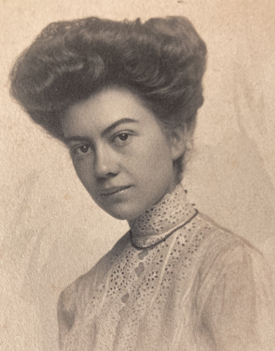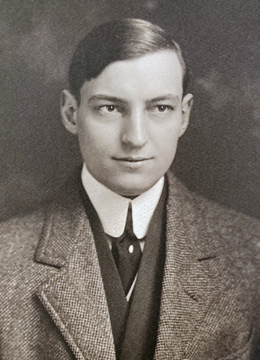Dorothy Hubbard (1890–1978) and Irvin Augustus Sims (1887–1924)
|
Dorothy Hubbard, the only child of Henry Fitch Hubbard (1859–1903) and Sarah Edwards Rowe (1862–1914), was born in Lincoln, Nebraska, in 1890, where her father, a salesman for the Simmons Hardware Company of St. Louis, was temporarily assigned. Dorothy was raised in St. Louis on stylish Westminster Place. Undoubtedly, the plan was for her to enjoy an affluent childhood, becoming a debutante and marrying a successful man in St. Louis. This didn’t happen. Her father died unexpectedly in 1903, leaving a significant estate but also near-ruinous debts. Though the family’s reduced circumstances ended their upward mobility in St. Louis, Dorothy and her mother continued summering in Maine, and Dorothy graduated from the Mary Institute (1908) and Wells College (1912). At Wells, she was student body president and won a number of other honors. In 1914, just after her mother died suddenly of a stroke, Dorothy married Irvin Augustus Sims (1887–1924), a 1909 graduate of Washington University in St. Louis. Irvin was the son of William Irvin Sims (1852–1911) and Annie Frank Noble (1862–1921). The Sims family had moved from Georgia to St. Louis about 1893, and William started a moderately successful dry-cleaning business. The young married couple relocated to Decatur, Illinois, where Irvin was associated with Charles Blackburn Sims (1868–1945), a cemetery developer who was his brother-in-law and by coincidence had the same surname. There, Irvin worked on developing the Fairlawn Cemetery. In 1916, the Simses moved to Savannah, Georgia, where Irvin helped develop at least two more cemeteries, including one in Huntington, West Virginia. Dorothy and Irvin had four children: Henry Fitch Hubbard (1915–1999), Dorothy (1917–2013), Virginia Mary (1921–2007), and Anne Noble (1923–2010). In 1924, Irvin committed suicide in West Virginia by swallowing cyanide, for reasons not known for sure, leaving Dorothy with limited financial resources. She never remarried. In 1930, Dorothy moved to Portland, Maine, which offered better schools and easier access to her summer home. In 1935, Dorothy and a first cousin sued her step-grandmother’s guardians in St. Louis for mismanagement of family assets, and after her step-grandmother’s death, she and her cousin unsuccessfully contested the will. She inherited some money, though not as much as she had hoped for. The legal actions taken in the 1930s permanently cut off her connection with her St. Louis relatives. In Portland, she was a volunteer and board member of the Maine League for Planned Parenthood, a controversial organization for her era. She acted with the Portland Players in leading roles. She was an active member of the Colonial Dames and had two lines of Mayflower descent; she resigned from the DAR after the famous incident involving Marian Anderson. Originally Episcopalian, she became Roman Catholic in 1959 fulfilling a promise made to her son, Henry Fitch Hubbard, who had become a priest in the Catholic Church. Dorothy died in 1978 and was buried in Calvary Cemetery, South Portland. There are no Sims or Hubbard family members remaining in St. Louis. Written by McKelden Smith © 2022 St. Louis Genealogical Society
|
 Dorothy Hubbard Dorothy HubbardPhoto in the collection of McKelden Smith Used with permission  Irvin Sims Photo in the collection of McKelden Smith Used with permission |
Return to St. Louis City/County Biographies.
Last Modified: 16-Jul-2022 09:48